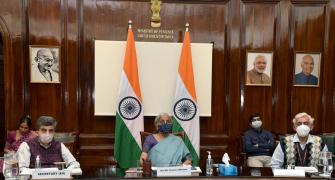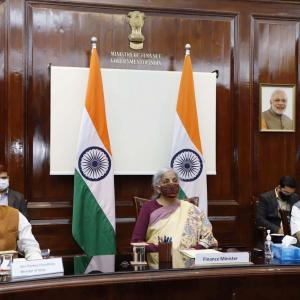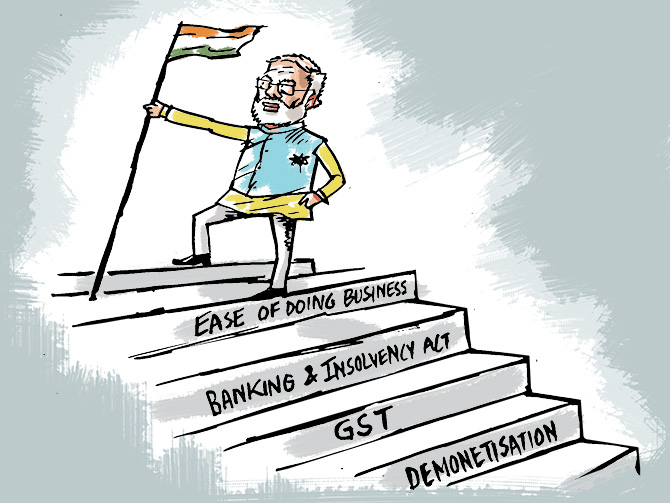The challenges before the Budget are more daunting than those in 2021, observes A K Bhattacharya.

When Finance Minister Nirmala Sitharaman presented her last Union Budget, the odds were heavily stacked against her.
The Indian economy was going through its worst contraction and the uncertainty over the next Covid wave was looming large.
But her Budget speech recognised both the challenges and the importance of bold steps to tackle them.
In retrospect, the Budget for 2021-2022 turned out to be a decisive one, launching new initiatives and transparent accounting, even while remaining committed to the broad goals of fiscal consolidation.
In her 2021 Budget, she had announced an ambitious national monetisation plan and a massive national infrastructure pipeline to both augment government revenues and revive investment to boost growth.
An increase in government investment was badly needed in an economy where the private sector with low capacity utilisation had no desire to make fresh investment.
The gross tax revenue projections were modest with a growth rate of less than 17 per cent.
Her plan to significantly reduce the government's extra-budgetary resources showed her commitment to accounting transparency by trying to end the practice of the previous few years to hide the actual extent of deficit.
And she reiterated the government's commitment to reforms like the redefinition of small and medium enterprises, commercialisation of the mineral sector, privatisation of State-owned enterprises and amendments to the laws on agriculture and labour.
Almost a year later, as Sitharaman prepares to present her next Budget, the scorecard of what she has achieved through her last Budget and where she could have done better provides a mixed picture.
She looks set to achieve her accounting transparency goals.
It is even likely she would not need any extra-budgetary resources for 2021-2022.
The Budget had provided for about Rs 30,000 crore (Rs 300 billion) of extra-budgetary resources to meet a few government schemes.
But it seems she may not have to seek recourse to such resources in the current year.
Compared to 2021, the macroeconomy looks better now.
Instead of a contraction of 7.3 per cent in 2020-2021, the economy is set to grow by 9.2 per cent, according to government estimates.
However, the scars on the economy are visible.
Inequality, as shown by various surveys, has risen.
Increasing employment remains a challenge.
Private consumption demand is still below what it used to be two years ago.
Inflation is rising and it threatens the stability of the past few years on the price front.
On tax revenue growth, she has done well, but has made little progress in widening the tax base, as a result of which the overall share of taxes in gross domestic product has remained virtually static at around 9 to 10 per cent, compared to over 11 per cent achieved in 2018-19.
For the current year, however, the increase in tax revenues should take care of a large part of the excess expenditure the government incurred on various schemes including the food ration programme, fertiliser subsidies and export promotion.
The shortfall in divestment revenues (assuming that the initial public offer of shares of Life Insurance Corporation would go through before end-March 2022) would be made good by the expenditure cushion arising out of a higher nominal size of the economy and the inability of many government departments to spend the money allocated to them.
This is likely to help Sitharaman to adhere to the fiscal deficit target of 6.8 per cent of GDP in 2021-2022.
However, serious questions will be raised on the manner in which the target would be achieved.
The bonanza of a higher nominal size of the economy (the nominal economic growth was 18 per cent, compared to the Budget's assumption of 14 per cent) may not be available in 2022-2023, dampening prospects of revenue growth.
The government's inability to spend the money meant for its various schemes, particularly under capital expenditure, is another cause for concern as it will hurt the economy's growth prospects.
The government's spending on the national infrastructure pipeline, rolling out the 4G technology, Digital India mission, RoDTEP or the scheme for remission of duties and taxes on export products, and even the Jal Jeevan Mission has been way behind the targets, at least in the first three quarters of 2021-2022.
Even if the expenditure in the last quarter is ramped up, the government will have to address questions about the poor absorptive capacity of departments in spending the money allocated to them for important national schemes.
A more efficient and effective system of monitoring government expenditure is the need of the hour.
What about the 2021 Budget's commitment to reforms? On privatisation, the sale of Air India to the Tatas would count as a big plus, although the government's cash receipt on this account would be about Rs 3,000 crore.
The big gain would be that Air India would cease to be a drain on the government's resources from 2022-2023.
The Central Electronics Limited was privatised, but it is now held up as trade unions have challenged the sale in a court of law and the government is probing if there were irregularities in the manner in which the company was sold.
The proposed privatisation of two state-owned banks and an insurance company has not made any headway.
The law on reducing the government equity in insurance companies below 51 per cent has been passed.
But there is an assurance from the government on the floor of Parliament that the reduction in equity below 51 per cent does not mean that the government would give up its management control.
While the government's track record with regard to privatisation presents a mixed picture, the reforms of farm and labour laws raise troubling questions.
The three farm laws, passed in 2020, have been repealed.
The government is now saddled with an additional problem of responding to the demand for announcing legally guaranteed minimum support prices for crops.
Even the four new labour codes, passed by Parliament in 2020, are yet to be notified as only about half the states have concurred with the central labour laws.
There is no clear road map of how soon the labour codes could be notified.
With such a track record, will her coming Budget lack credibility if she were to announce more privatisation?
The backdrop against which Sitharaman will be presenting the Budget for 2022-2023, therefore, is no less daunting than the one she encountered while presenting her last Budget.
This year she has to contend with a wide range of challenges -- a recovering economy facing headwinds due to rising prices and poor consumption demand, improved tax revenues that could do better with the widening of the tax base, poor spending capacity of government departments, mixed signals on privatisation and stalled reforms in farming and labour laws.
Add to this, the five state assembly elections to be held in February-March, which would also cast their influence on the Budget exercise.
The Chief Election Commissioner has already clarified that the Election Code could not be enforced on the announcements that the Budget would make.
Thus, Sitharaman may be encouraged to announce such proposals in her Budget that should help win over the electorate in the five election-bound states, in particular.
But populism or loosening the purse strings at this stage will have other costs that the economy will have to bear.
As Sitharaman will reckon, making a Budget when the economy is recovering poses more difficult challenges than what one faces while making a Budget after the economy has contracted.
Feature Presentation: Aslam Hunani/Rediff.com










